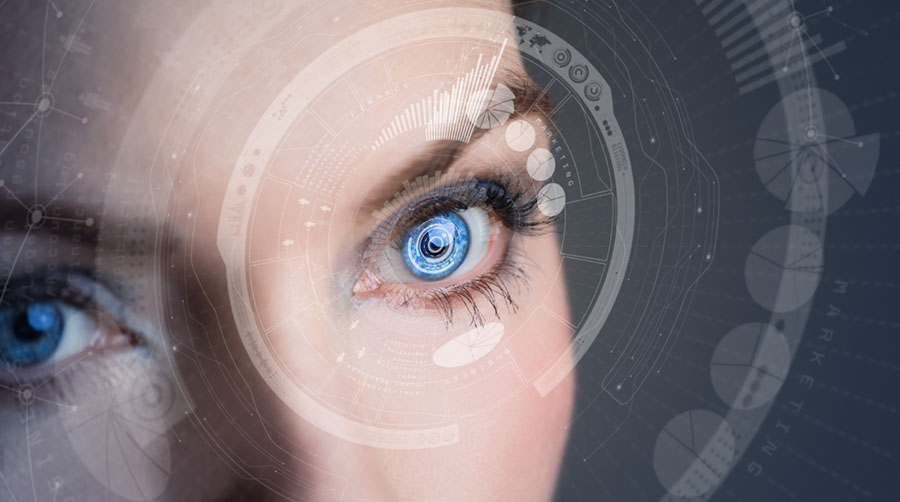
Biometric Eye History Examined
A Biometric Eye History of Retinal Scanning Shows the Growth of the Police State. Modern Security Controls You While Making You Accustomed to Invasion of Your Privacy.
Biometric eye history includes retinal scanning as the forerunner for this new type of biometric technique. Developers of biometrics state that the iris is one of the most accurate and unchanging of all biometric measures.
Iridian Technologies, the company that holds the patents on iris recognition, states that it takes only two to three seconds for software to match an individual’s iris against a database that holds over 100,000 other samples.
Fingerprint biometrics can take up to 15 minutes to find a match in a database. Eye biometrics work by scanning the iris and the retina to create a pattern which is then stored in a database.
Iris recognition systems are becoming more and more common and can be found in use by some government agencies such as the Department of Defense and Congress.
There are some commercial companies currently using iris recognition biometrics including Hewlett Packard and Bank United.
Several airports are also using iris recognition biometrics in addition to other security features and the United States Custom Department uses this technique as part of their inspection process as passengers move through security.
Biometric eye history has come a long way since it was first used in 1985, when it was known as retinal scan technology.
It is time to ask the bigger questions. Why are such tight parameters needed for personal identification, and how does it tie in with government plans to develop a method to track every citizen, anywhere on the planet?
Privacy: Biometric Eye History
The minute our biometric data is entered into a computerized database that data is no longer private and it is shared across the country by anyone who is able to access the database, such as government, law enforcement and security agencies, Americans can be tracked.
They tell us that our information is safe and secure and it will only be used when necessary, by those who are authorized to view it. Common sense tells us this is not true.
But who is going to be looking at our personal data if we are law abiding citizens, and there really shouldn’t be any reason for us to be noticed?
Take a moment to consider that every time you leave the country to go as far away as Europe or as near as Canada, in fact, every time you leave the United States, your data will be accessed when you hand your passport to security, and in some cases your private information can be read by equipment that detects your information as you walk by.
This is an immediate violation of our rights and privacy; we are now being tracked by our government in the same way that foreign officials were tracked in 2001, right after the 9/11 attack.
Identity Theft
Despite the known biometric eye history showing it to be safe and secure, there still exists the possibility that we can have our identity stolen when thieves use some of the other biometric information we have stored in those databases.
As safe and secure as they tell us our personal and biometric information is in databases, identity theft is becoming more sophisticated, so theives will be able to break through this security.
And what about the danger of losing biometric information that belongs to one person and storing it with the photo of another? It’s not a matter of if this can happen but rather a matter of when it will happen.
Unwittingly, citizens may suddenly find themselves being accused of something they didn’t do or they be unable to move freely around the country because they’re linked to the identity of someone else.
Big Brother is Watching
The increased use of biometrics all around the world, particularly by government organizations, leave many wondering if we are entering an age of having Big Brother watching everything we do. And those who don’t wonder, know.
As of yet, there are very few laws and regulations governing the use of biometrics, and until world governments join together to come up with universal policies, the use of this technology will go unsupervised.
If left ungoverned, civil rights and privacy advocates feel that biometric techniques will step on the rights of individuals and the freedoms we’ve come to expect in this country.
While the ACLU has gone on record to state that they accept and understand using biometrics in airports and in London to solve the bombings, they also believe that biometrics are a blatant misuse of personal data and takes away our individual identities.
The future for Americans in a biometric society means acceptance of having their irises scanned, their fingerprints taken, even when they haven’t committed a crime.
All of this information will be stored in massive databases that can be accessed at any time. We will no longer have the freedom to move around in our own country without being noticed and recorded.
When will you realize that the government, if it has its way (the way of the global elite) will make slaves out of its citizens in the interest of a more profitable enterprise.
Biometric eye history is the beginning of the end of privacy.

 My First Amazing Ayahuasca Experience
My First Amazing Ayahuasca Experience  Pine Needle Tea
Pine Needle Tea  The REAL Controllers of Humanity: The Papal Bloodlines
The REAL Controllers of Humanity: The Papal Bloodlines  Is it Global Warming or Cooling?
Is it Global Warming or Cooling?  Gun Rights and Obama Examined
Gun Rights and Obama Examined